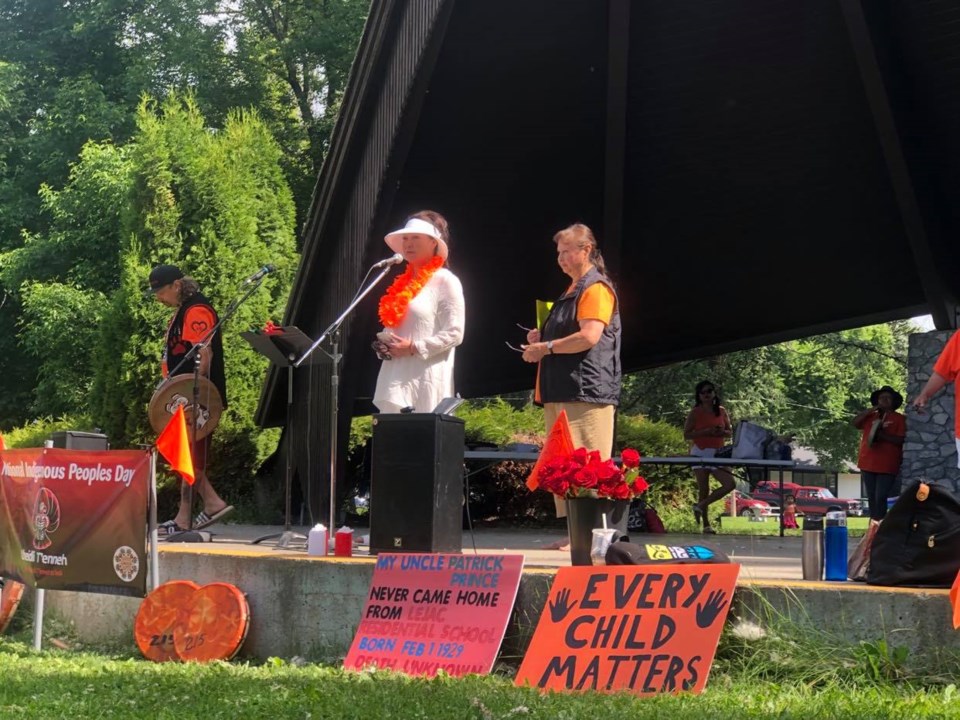Lheildi T’enneh Chief Dolleen Logan is calling for National Indigenous Peoples Day on June 21 to become a national public holiday.
National Aboriginal Day (now National Indigenous Peoples Day) was announced in 1996 by then Governor General of Canada, Roméo LeBlanc, through the Proclamation Declaring June 21 of Each Year as National Aboriginal Day.
It was created as a day for all Canadians to recognize and celebrate the unique heritage, diverse cultures, and outstanding contributions of First Nations, Inuit and Métis peoples.
However, it is only a provincial statutory holiday in North West Territories and the Yukon, and is not a federal statutory holiday akin to Canada Day.
“Canada is only about a 154-years-old. First Nations have been around for nine thousand years and we should celebrate our land and our culture and celebrate the people that were here first,” said Chief Logan.
“It's not a holiday so we have kids at school that can't take time off and we have Indigenous workers and businesses that can't take time off work because it's not a holiday. If they could come and join and share our culture with non-Indigenous people, it would familiarize people and re-familiarize themselves with the culture.”
A bill creating a separate statutory holiday on Sept. 30, which is known as Orange Shirt Day, received royal assent on June 3 after passing unanimously in the senate.
Bill C-5 creates a statutory holiday for employees in the federal government and federally regulated workplaces to commemorate the tragic legacy of residential schools in Canada and would be known as an annual national day for truth and reconciliation.
The bill was fast-tracked in parliament after the remains of 215 Indigenous children in unmarked graves were discovered at a former residential school in Kamloops, B.C.
However, Chief Logan said National Indigenous Peoples Day on June 21 should still become a holiday.
“The 21st is a day to celebrate and a day to mourn. It would be a healing journey for everyone, Orange Shirt Day is to remember, but so is the 21st,” said Chief Logan.
“We all get together and talk and have fun and remember our culture and National Indigenous Day is for Indigenous People where we are proud to be who we are and where we came from and what our future will be.”
June 21 is normally a colourful and celebratory day, but this year it came on the heels of the discovery in Kamloops and several weeks of emotional events which have highlighted the need to reform institutions and policies that perpetuate systemic racism and discrimination against Indigenous Peoples.
“It was heartbreaking but I celebrated,” said Chief Logan, who attended the Prince George celebrations at Lheidli T’enneh Memorial Park.
“Indigenous Day was a day to celebrate being Indigenous and being proud of who you are. I let the people at the park know that yes, we are a strong Nation and strong people, but if it wasn't for our ancestors being strong to their culture, strong to everything, we wouldn't be here.”
As July 1 approaches and the public is faced with increasing awareness of Canada’s colonial history and legacy of residential schools, Chief Logan said she thinks people should still celebrate Canada Day.
“Because as First Nations we are not here to wipe out Canada,” said Chief Logan.
“We're here. We are very multicultural and Canada is very multicultural. Unfortunately, there's still a lot of racism, but Canada has been here for a 154 years and First Nations have been here for nine thousand years and why not celebrate together.”
Chief Logan said she is encouraging all Canadians to become familiar with their local First Nations history.
“Everyone, everyone, take five minutes and look up your local First Nations’ history. It’s time to educate everyone about how long First Nations have been here and what they've been through and not to only focus on residential schools, but the whole history.”
- with files from the Canadian Press




-web(1).png;w=120;h=80;mode=crop)


